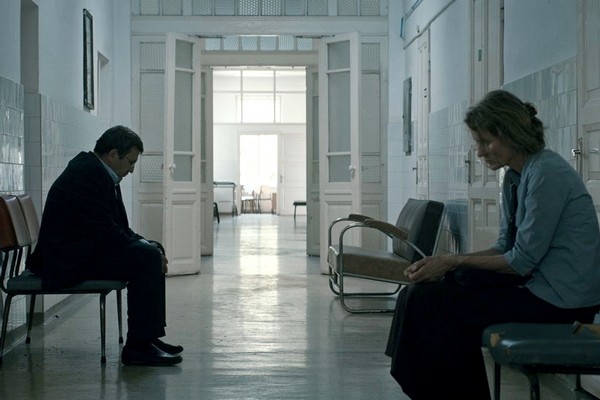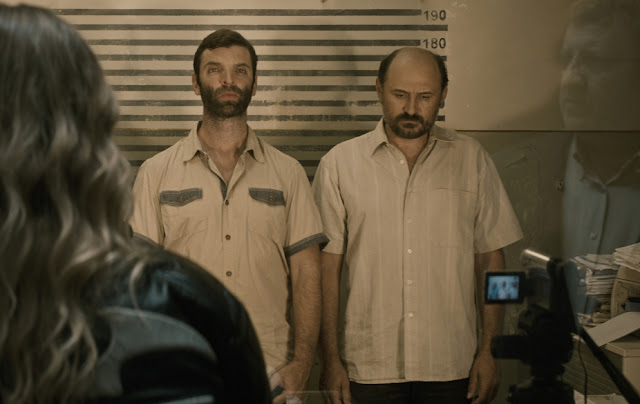In 2001, Romanian film-maker Cristi Puiu made the thought-provoking, low-budget road movie Stuff and Dough. The directorial style was marked with long shots and strict minimalism. The film is believed to have provided the right context for what’s now hailed as one of the important film movements of the 21st century – Romanian New Wave. While Cristi Puiu became the leading figure of this alleged movement, , Corneliu Porumboiu, Radu Muntean, Calin Peter Netzer, etc established or widened the style, imbuing the trademark long takes and naturalism. Romania is a country that is said to have redeemed from the rampant corruption & indifference of Communist era. But, these films showcase how the traces of the old system still remain deeply entrenched. Couple of things exhibits the marvelous nature of Romanian New Wave: Unlike the nearby countries Hungary, Poland, and Czech, Romania didn’t had a big cinematic culture in 20th century due to extreme cultural repression (I’m only aware of Lucian Pintille & Sergiu Nicolaescu apart from the New Wave directors); these films despite making a big noise on the film-festivals, the actual situation within Romania show very little support for the thriving of film culture. 2016 had been a great year for Romanian cinema. Cristi Puiu’s Sieranevada and Cristian Mungiu’s Graduation dominated at the Cannes Film Festival (with Mungiu sharing the Best Director’s Prize with Oliver Assayas).
Of course, New Waves aren’t meant to last for long time. The
film-makers’ energy may break up and the viewers may grow tired of the work.
But, as for now the Romanians are continuing to provide the most complex,
subtle, and fascinating works. Romanian film-makers of the new wave
have similar set of concerns – corruption, compromise, apathy, and twisted
bureaucracy. Their stylistic flourishes too have little differences. Yet, there
are distinct features that showcase how each film-maker brilliantly expresses
the similar set of concerns. Cristian Mungiu’s two previous films offered gut-wrenching
experience, lacking the ink-black comedic tone of Cristi Puiu’s films or the
interesting quirkiness of Porumboiu’s works. Mungiu’s 2007 drama 4 Months, 3
Weeks, and 2 Days won the Palme d’Or. It depicted the unflinching reality of a
woman seeking abortion in the Communist Romania. He followed it up with
blistering drama Beyond the Hills, which was set in an orthodox convent.
Comparing with these two movies, Mungiu’s recent film Graduation couldn’t
be declared as hard-hitting. Yet, it is incredibly nuanced and infinitely
complex than what the plot line seems to convey.
In his interview to LA Times, Mungiu says, “We live in a
world and society that is not very moral but it is made up of people who
believe they are moral”. This basic conflict Mungiu points out in our so-called
democratic society is what he brilliantly dissects in his fear-inducing family
drama Graduation. The movie opens with a static shot of a calm street near
a bland apartment housing complex. The next static shot shows the living room
of an apartment. A stone shatters the glass window of the house. The
family-head looks out for the person with no good results. The shattering of
glass signals the arrival of intricate problems Mr. Romeo Aldea (Adrien
Titieni) going to face in the next three days. The little stone may have just
altered the family’s composure, causing the ripple effects. Romeo is a reputed,
middle-aged doctor, living with his detached librarian wife Magda (Lia Bugnar)
and loving daughter Eliza (Maria-Victoria Dragus). Thanks to Eliza’s dedication
and Romeo’s stubborn stand, she has secured a scholarship to do college in
Cambridge University. The important final exams are going on and Eliza is all
set to easily score an average of 9 to make it to England.
 |
| The alienated couple Romeo Aldea and Magda in a bland corridor with a sense of entrapment |
Alas, a tragedy strikes up their plan. Eliza is sexually assaulted before her final exams, in an empty space close to the school
building. The distraught father Romeo, who wants his daughter to have a better
life abroad, sets out to do whatever necessary to realize their dream. Romeo
immediately finds out that the bureaucracy with its own set of red-tapes and
rigid laws has no empathy to show for Eliza’s predicament. It only escalates
Romeo’s conviction to free his daughter from the dangers plaguing the Romanian
society. He is all ready to cross the line for just one time. He hides his
guilt by saying ‘results are the only things that matter, not how you achieve
it’. Dr. Romeo wades through bureaucratic buildings and bureaucrats’ house to
find a good ending. The situation only gets muddled. His disillusionment
affects his relationship with daughter Eliza. She is baffled at her father’s
choice to upend the values he had believed and taught her. The rippling effect
also brings to surface the other contaminated aspects of Romeo’s life. His
year-long affair with a single-mom Sandra (Malina Manovici) comes to the
knowledge of Eliza. And so, alongside the moral position, Romeo’s position in
the family too implodes.
Cristian Mungiu’s direction as usual refrains from drawing
even a slight attention. None of the shots are cut for a close-up. The
continuity of life’s simple moments isn’t disturbed (thanks to brilliant,
seamless editing). There’s also no music. And, yet, Mr Mungiu instills enough
humanity within the dire situation that we are able immerse ourselves in the
moments alongside the characters. The early monotonous-looking tone of the
narrative slowly paves way to labyrinthine situation and relatable ethical
dilemmas. Mungiu always encourages his
actors to under-play and deliver the dialogues in a low voice. It sounds very
naturalistic, blending the complicated inner feelings with the uttered words.
Although the lack of stylistic adornments and a simple-looking acting process
may give off the feeling that Mungiu’s directorial style is easy to structure, in
reality it is anything but easy. Mungiu confides that his way of capturing the
dialogues gives a very hard time for the sound guys. He also takes a lot of
time to perfect the trajectory of static camera angles to catch the
complications within the setting. And, to attain the level of emotional precision
he wants, Mungiu opts for repeated takes (from 5 to 30), pushing his actors
into the constrained atmosphere of his characters.
The most impressive part of Mungiu or other Romanian New
Wave film-makers’ works is their long-takes. The long-takes follow up the
characters and their emotions in a manner which doesn’t pass off the feeling of
witnessing a long-take. Unlike the American counterparts, the East or Central
European film-makers like Mungiu don’t make the particular choice of
film-making noticeable. The central irony is that the more precise the setting
is, the more natural the emotions seem to be. Graduation employs the
visceral realism of Dardenne Brothers. The CCTV footage (works as vital part of
the plot) and the mysterious nature of attacker becomes the tangible, sinister
forces circling around to totally overturn the already frayed familial harmony.
The insistence of an unexpected, hidden force brings to mind the works of
Haneke, minus the auteur’s unparalleled nihilistic narrative threads
(Maria-Victoria Dragus who plays Eliza had a significant role in Haneke’s The
White Ribbon).
 |
| The eerie police line-up scene as Eliza tries to identify her attacker. Eliza's overbearing father stands next to her. The father's reflection on the one-way mirror may have an implicit meaning. |
Apart from the elements which pertain to contemporary
Romania, the film also makes a universal commentary about parenting; about how
the parents’ idea of sacrifice could be a self-centered thing. Mungiu’s camera keeps close eyes on Romeo
Aldea, making us empathize as well as observe his state of disillusionment. Graduation is about a man who wants to have complete control over situation and
people in his life. He ends up realizing the futility of trying to control the
circumstances. On one hand, he is slightly obsessed in finding the perpetrator,
while on the other hand he is relentless to solve the problem for his daughter;
both leading to situation that goes out of his grasp. The film could have been
easily turned into one man’s despair in an increasingly apathetic society
(making the usual comment, ‘society is not fair’). But, director Mungiu amply
concentrates on the moral compromises Romeo Aldea makes to depict how he isn’t
that different from the vile societal forces he was against all these years. Instead
of showing society as a detached element, Mungiu firmly pins the individual
within the society, exhibiting how each of his actions adds to the grass-roots
corruption. Nevertheless, the scenarios never turn out to be hopelessly grim so
as to lack the human emotions. Mungiu’s final images look something close to
redemption and hope; or the sinful past generation, unknowingly, has passed on
its sins to the smiling, young graduates. Whatever it is, the ambiguity and
complexity of real life is arrested within those final frames.
Graduation (123 minutes) is a mature and challenging
examination of parental dilemma and how moral boundaries are blurred in an
atmosphere of indifference and corruption. Although the story line makes it seem
like a simple, morality play, director Mungiu’s remarkable minimalist
film-making and low-key performances infuses enormous profundity.
Readers, please feel free to share your opinion by leaving your comments. As always your valuable thoughts are highly appreciated!
Readers, please feel free to share your opinion by leaving your comments. As always your valuable thoughts are highly appreciated!
People who liked this also liked...



0 comments:
Post a Comment
Thanks for sharing for valuable opinion. We would be delighted to have you back.